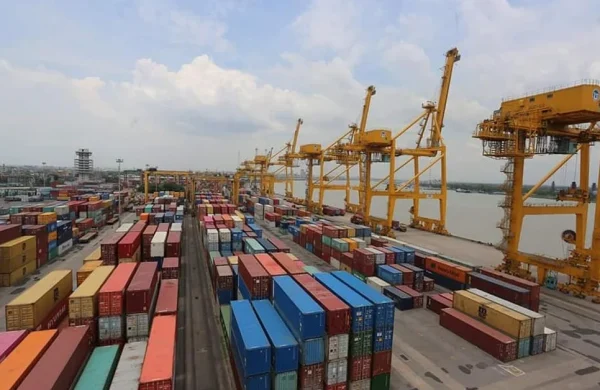4 barriers to export disaster
- Update Time : Saturday, December 7, 2024

TDS Desk
Despite the potential for growth in sectors beyond ready-made garments (RMG), many industries remain underdeveloped. Analysts cite policy challenges, funding constraints, lack of infrastructure, and the weak bargaining power of non-garment exporters as key obstacles. As a result, ready-made garments still account for over 81% of the country’s exports.
While the diversification of export products has been a topic of discussion during the ousted Awami League government, progress has been limited, and the dominance of ready-made garments in exports persists.
The country’s ready-made garments exports have increased from $1.18 billion in the early 1990s to $47 billion in 2023, while exports of non-RMG products have grown from $810.1 million to $8 billion.
According to data from the Export Promotion Bureau (EPB), ready-made garments exports for the July-November period of the current fiscal year have totaled $16.11 billion ($1,611.71 million), compared to $14.34 billion ($1,434.65 million) during the same period last year, showing an increase of 12.34%.
In November alone, ready-made garments exports amounted to $3.31 billion ($330.61 million), up from $2.84 billion ($284.40 million) in the same month of the previous year, marking a growth of 16.25%.
Reports from Bangladesh Bank shows that, in 2023-24 fiscal year, earnings from ready-made garments exports have reached $36 billion, accounting for 81.29% of total export earnings.
Analysts say that due to lower incentives for sectors other than ready-made garments, the export of new products is not developing. They suggest that equal support should be provided to all products for diversification.
According to data from the Export Promotion Bureau (EPB), agricultural product exports during the July-November period of the fiscal year have totaled $495.3 million, compared to $457.2 million during the same period last year, showing an increase of 8.34%.
Exports of leather and leather products have reached $466.3 million, marking a growth of 7.61% compared to the previous year.
Jute and jute product exports have amounted to $341.7 million, a decrease of 9.99% compared to the previous year.
Home textile exports have generated earnings of $326.8 million, reflecting a growth of 5.03%.
A report by the Asian Development Bank (ADB) on promoting export diversification in Bangladesh highlights that the country’s exports are four times more concentrated than the average of developing nations.
Furthermore, Bangladesh is also struggling with a lack of diversification in its export markets.
Selim Raihan, Executive Director of the South Asian Network on Economic Modelling (SANEM), said that the diversification of export products faces several challenges, including policy issues, financing barriers, lack of infrastructure, and the weak bargaining power of non-garment exporters. He noted that exporters of garments and non-garment products do not receive equal benefits.
“Garment exporters can import capital machinery duty-free, while non-garment exporters have to pay high duties on essential equipment. Non-garment exporters also do not have easy access to bonded warehouse facilities like garment exporters. This is a major obstacle to accelerating export diversification,” he explained.
He further added that the lack of infrastructure and adequate government support is hindering the growth of agricultural exports.
Entrepreneurs in the ready-made garment sector have pointed out that the industry is falling behind compared to competitor countries due to energy shortages, a lack of skilled labor, and limited access to modern technology. They also believe that reducing over-dependence on garment exports through diversification is necessary.
Citing a World Bank report, industry experts say that while competitor countries have made technological advancements in garment production, Bangladesh is lagging behind. Korea has already moved ahead, Brazil is progressing, and Vietnam is on its way.
Entrepreneurs have stated that due to a shortage of LCs (letters of credit), they are unable to import raw materials.
Commenting on this, M. Masrur Reaz, Chairman of Policy Exchange of Bangladesh, said, “Due to a lack of policy reforms, the share of non-garment products in the country’s export sector has declined. These industries require proper support in areas such as logistics, technology adoption, and workforce skill development.”
Entrepreneurs have noted that the cash assistance for garment exports has been reduced from 11% to 7%. They also mentioned that they face various regulatory challenges imposed by buyers, which are creating difficulties for stakeholders in the sector. They stress the need for increased subsidies and a stronger focus on research.
In this regard, Mohammad Hatem, President of BKMEA, stated “If Bangladesh can establish a national code of conduct, no buyer can impose their own code of conduct on us.” He urged the Commerce adviser to take the initiative in creating a national code of conduct.
“Our Textile Department is not self-sufficient. Whatever we need, the Textile Department should provide. After applying, they will inform me whether I will get a gas connection at my factory. If I get the connection, I will set up a gas-dependent industry. If not, I will not. I am sitting with machines after taking loans from the bank, but I am not being provided with a gas line or electricity connection. We are facing various problems,” he added.
Entrepreneurs have called for long-term solutions to address such issues and have demanded an increase in export subsidies.
Additionally, garment industry owners have emphasized the need to increase the use of man-made fibers instead of cotton fibers.
Recently, at an event, Commerce Adviser Sheikh Bashir Uddin addressed business leaders, saying, “You must always bring appropriate proposals. In the past, our economy faced a rise in criminal activities, and we are now paying the price for it.”
The advisor urged everyone to work together to prevent further chaos.















